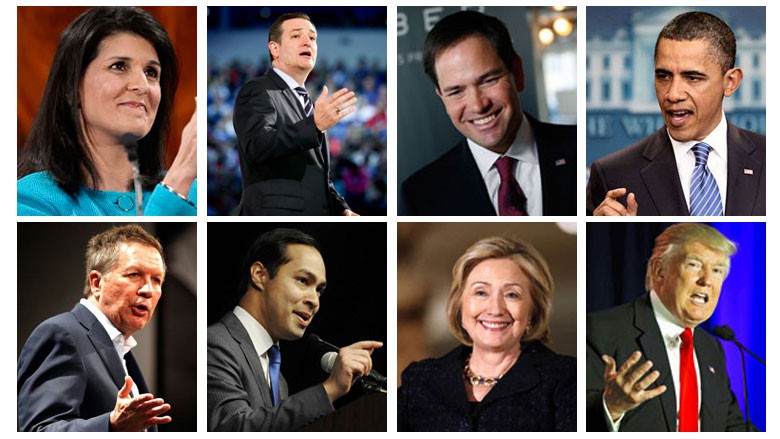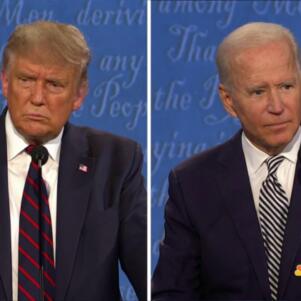Eight political predictions for 2016
By Jennifer C. Braceras | January 4, 2016, 6:55 EST
 (AP photos)
(AP photos) 2016 is finally here. And, although much can change between now and the Iowa caucuses (February 1) and New Hampshire primary (February 9), below are eight political predictions based on presidential campaign history and the current state of play:
8. Ted Cruz will win the GOP Iowa Caucuses
Iowa is fertile ground for the campaign of Texas Senator Ted Cruz. The Iowa GOP caucuses are dominated by evangelical voters, who tend to show up at these relatively small community gatherings and lobby hard for their candidates. (In 2012, evangelical or born-again Christians accounted for 60 percent of GOP caucus-goers.) Long suspicious of Donald Trump, Iowa evangelicals lately have been trending toward Cruz, whose father is a pastor. And Bob Vander Plaats, an Iowa evangelical who endorsed the past two Iowa GOP winners, recently endorsed Cruz. In a recent poll, the Des Moines Register has the Texas Republican up by 10 percentage points, and the latest RealClearPolitics average has Cruz ahead by 3.9 in the Hawkeye state. Although Iowa voters are notorious for making their final choices late in the game (making Iowa polling somewhat unreliable), I predict Cruz will pull this off. Will a Cruz victory in Iowa presage a GOP nomination? Not necessarily. Remember, Mike Huckabee and Rick Santorum won Iowa in 2008 and 2012, respectively. But a Cruz victory here could sound the death knell for candidates like Ben Carson and Santorum, who each hoped to be the candidate of evangelical voters in 2016.
7. Bush will get “Trumped” in the New Hampshire Republican Primary
Former Florida Governor Jeb Bush, an honorary New Englander whose family spends summers in nearby Maine, has invested heavily in New Hampshire’s first in the nation primary on February 9. But the latest RealClearPolitics average has Bush at only 7.7 percent in the Granite State. With Trump beating his closest opponent (Florida Senator Marco Rubio) by an average of 13 percent, Bush’s best hope might be that most New Hampshire voters have yet to make up their minds. Currently, Cruz, Rubio and New Jersey Governor Chris Christie are running neck-and-neck for second place in New Hampshire. It may be wishful thinking, but I’m putting my money on Rubio coming in second to Trump.
6. Donald Trump will not be the Republican nominee for president
Trump may win New Hampshire, but I still don’t think he will win the Republican nomination — although I confess that he is starting to make me a bit nervous. It is true that in modern presidential history only one candidate (Bill Clinton) has won his party’s nomination without winning in either Iowa or New Hampshire. (Clinton garnered less than 3 percent of the vote in the 1992 Democratic Iowa caucuses — native son Tom Harkin garnered 76 percent of the Democratic vote that year. And Clinton declared himself the “comeback kid” when he came in second to former Massachusetts Senator Paul Tsongas in New Hampshire that same year.) But this year is not like other election years and, as in 1992, the year 2016 could see New Hampshire’s second-place GOP finisher (Rubio, according to Prediction #4 above), clinch the party nomination.
5. The GOP race will come down to Cruz vs. Rubio; Rubio will, ultimately, prevail
Many pundits have predicted that the 2016 GOP presidential race will come down to a choice between two conservative, Cuban-American, first-term senators: Cruz and Rubio. I agree. And, as between the two, I believe (hope?) that Rubio will prevail. Why? It’s simple. Although Cruz may seem attractive on paper to many conservative voters, he is, quite frankly, an unacceptable choice to almost every Washington Republican – even the conservatives. And, despite what some Cruz supporters would have you believe, insider dislike of Cruz is not ideological. It’s personal — because Ted Cruz is incapable of hiding his contempt for colleagues he regards as less intelligent than he (which, in his view, is almost all of them). Of course, it’s always possible that the voters will steamroll the Washington insiders and nominate Cruz despite his reputation as an arrogant and abrasive fellow. But something tells me that, in the end, Cruz’s personality will turn off conservative primary voters, just as it has turned off his colleagues.
4. Hillary Clinton will pick Julian Castro as her running-mate
Particularly if the Republicans nominate Rubio or Cruz, look for Hillary Clinton to select Secretary of Housing and Urban Development Julian Castro as her running mate. Hispanics are, of course, one of the fastest growing voting blocs, and Clinton will need their votes if she is to cobble together a winning coalition. And Clinton will use her liberal Mexican-American running-mate as a weapon to delegitimize any attempt by Rubio or Cruz to make electoral inroads with Latinos.
3. Marco Rubio will pick John Kasich or Nikki Haley as his running-mate
Smart money is on Rubio (or any GOP nominee) picking Ohio Governor John Kasich as his (or her) running mate. No Republican has ever won the presidency without carrying Ohio (the last Democrat to do so was John F. Kennedy), and Kasich is immensely popular in his home state — even among Democrats. Of course, assuming that the Republicans do not nominate Carly Fiorina, it is possible that the eventual GOP nominee will try to make a play for female voters (and counter Hillary’s claim on history) by selecting a female running mate. If the GOP nominee seeks a female running-mate, I predict he will choose conservative favorite South Carolina Governor Nikki Haley. (Although some might argue in favor of Fiorina on the grounds that she has already honed her Hillary-attack skills on the campaign trail, the former Hewlett-Packard CEO has little political experience and would not be as strong a choice as Haley, a tested executive.)
2. Marco Rubio will win the 2016 presidential election
Clinton will do her best to make the 45-year-old Rubio seem like a child with insufficient experience to be commander-in-chief. Of course, after spending nine years in the Florida House of Representatives (the last two as speaker) and five years in the United States Senate, Rubio may be young, but he is politically seasoned. Moreover, if Kasich is on the GOP ticket, Clinton will have a hard time making the case that a vote for the Republicans is a vote for inexperience. Regardless of running mate, however, I predict that Rubio will win on the basis of personality – – because Rubio’s sunny disposition and patriotic, optimistic vision of America will, in the end, attract more swing voters in key states than Clinton’s dour personality and sense of entitlement ever will.
1. The next person appointed to the Supreme Court will be either Ted Cruz or Barack Obama
O.K., this one won’t happen in 2016. After all, the next president won’t be sworn in until January 2017. And who knows when the next Supreme Court vacancy will occur? But when the time comes, I expect President Rubio to appoint Cruz, his former opponent, to the high court. In so doing, Rubio will satisfy his conservative base, while at the same time assuring an easy confirmation battle: after all, most of Cruz’s senate colleagues will be more than eager to get rid of him and will, therefore, rapidly vote to confirm his appointment. Of course, should Prediction #2 be wrong and Hillary Clinton win the presidency, expect President Clinton to nominate Obama (who, after all, fancies himself a constitutional scholar).
Jennifer C. Braceras is Editor of the NewBostonPost. You can read her past columns here.











